How to Write a Management Summary for Your Business Plan
Entrepreneurs are often celebrated for their uncanny ability to understand others – their customers, the market, and the ever-evolving global...
9 min read
![]() Christina Hersey
Jan 10, 2023 8:35:55 AM
Christina Hersey
Jan 10, 2023 8:35:55 AM
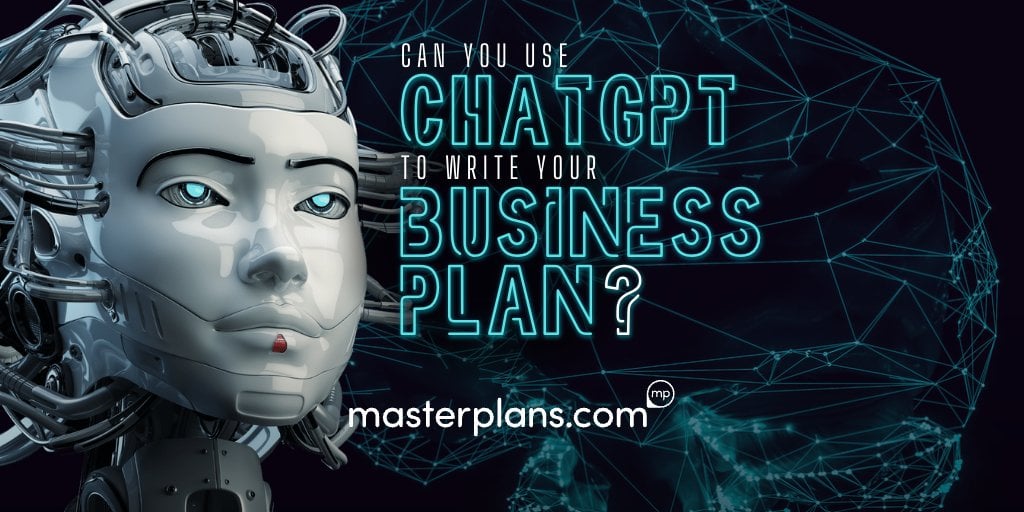
When an esteemed colleague told me about ChatGPT about a month ago, I was well into the Christmas spirit and not interested in assessing the risk that AI Language Models pose to my livelihood.
I’ve been a business plan writer and researcher for longer than I want to count, because doing so would force me to confront the fact that I am no longer in my twenties, nor even my thirties. As a veteran writer, this isn’t the first time I’ve been told of my imminent replacement by bots.
Are we even ready for what's coming? Like ChatGPT can already do 90% of all white collar jobs in existence.
— Varun Mayya (@VarunMayya) December 5, 2022
Where are these people going to go? How are they going to pay off existing loans? How are they going to earn? (not earn less, they'll earn 0)
But the drumbeat has been getting louder in the past year or two, so I’ve tried out several AI natural language tools to see what they can do. Each time, I’ve been left quite underwhelmed.
So last month, when my coworker told me to try out ChatGPT, I asked the bot to write me a fantasy novel with a female protagonist, giggled for a bit, and went back to writing my Christmas list.
But now the holidays are over, and I am ready to contemplate the capabilities and implications of this technology with the gravitas this topic deserves, having seen numerous doomsday articles over the holidays about, for example, how kids are going to use this technology to cheat on all their term papers from now on and never get caught. (Spoiler alert: this kid already solved that problem. That didn’t take long.)
So, I logged back into ChatGPT and decided to really test out the software’s capabilities as they apply to business plan writing, instead of just asking it to write me a Mad Libs about dragon hunting (just kidding, I did that too).
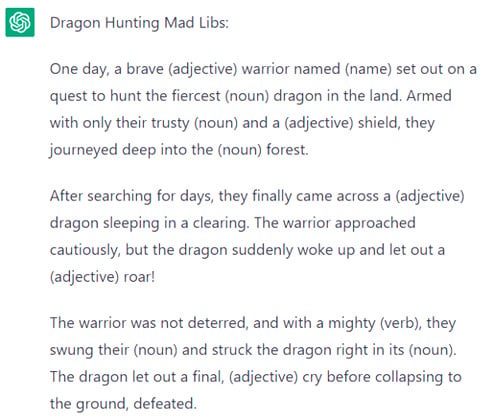
Ok, I’m done joking around. I promise I can treat this topic seriously.
When I’m working on the business plan, by far the most time is spent on market research. This section of the plan is key to making the case that there’s a demand for the associated company’s product or services and that a company stands a chance of not being crushed by the existing competition. For us, it’s a labor-intensive task that involves utilizing several market research tools, paid ones such as IBISWorld, ArcGIS Business Analyst Online, and Statista, along with free internet searches and industry reports.
For my first test, I asked ChatGPT to tell me how many ice cream shops existed in Baltimore, just to see if it could help me write a competitive comparison for a theoretical business plan we might be asked to write.

My dream of commanding an army of AI robots that do my writing is not materializing as quickly as promised.
A second request for the number of ice cream shops in Baltimore before 2021 also failed.
That’s right, not only did ChatGPT refuse to give me localized data, but it also couldn’t deliver any current data, either! And, when it comes to market research, having up-to-date information is critical. If we've learned anything from several years of global pandemic, hyperinflation, and now AI (potentially) taking our jobs, it's that industry trends move quickly. In reality, at Masterplans, we try to limit our data to the previous year, with a strict rule against using statistics older than two years.
But maybe I can somehow salvage this! If this tool can at least give me data up to 2021, I can do the rest myself. Perhaps I asked for something too specific, so I decided to broaden my request. By a lot.

With this, ChatGPT at least made an attempt to answer my query. But the results were so generic as to be laughable. They sounded as if they were written by a 10th grader writing a paper for an economics class, and there was no hard data at all:
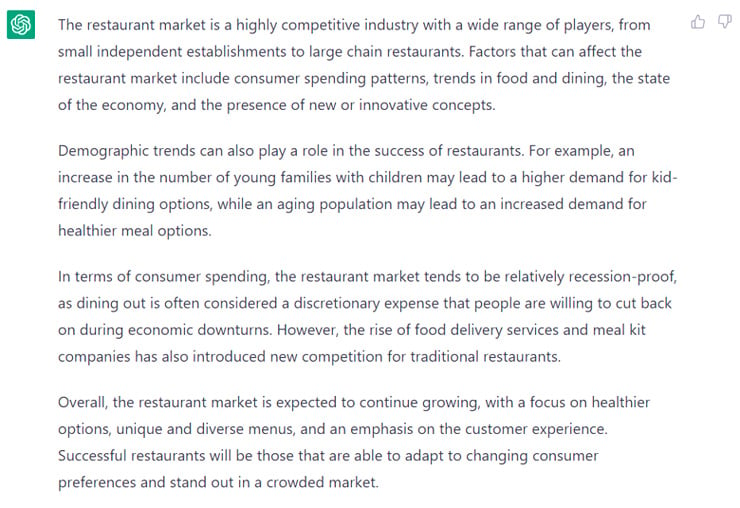
Can you imagine delivering that as part of a business plan and asking for funding based on this analysis of your market?
At this point, I lost all hope that ChatGPT will make it easier to write the most challenging section of the business plan narrative, so I moved on to other sections that are addressed in a business plan.
A key to creating a successful startup is defining a company's unique value proposition, or what distinguishes this company from its competitors. So this time, I decided to ask the software to write a competitive comparison of the strengths and weaknesses of the top five trucking companies in the nation, and for the first time, the results were almost passable. Here’s an excerpt:
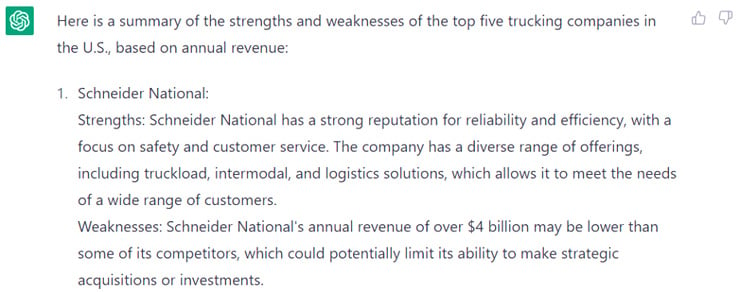
It’s still pretty generic, but we’re at least within range now.
I would never give something so basic to a bank lender or investor, but I'm sure that a professional writer with writer's block could use this as a starting point to rewrite it and update the numbers.
This would deliver no time savings at all but potentially help a writer break out of a rut in their game.
Of course, this competitive analysis is insufficient if AI can’t help me find and write about smaller, locally based companies that our small startup will compete against, especially considering some haven’t been in business for more than 2 years.
Since I seemed to get better results from this search, I decided to directly ask ChatGPT about competitive advantages, which gave me the best results yet. Here’s an excerpt:
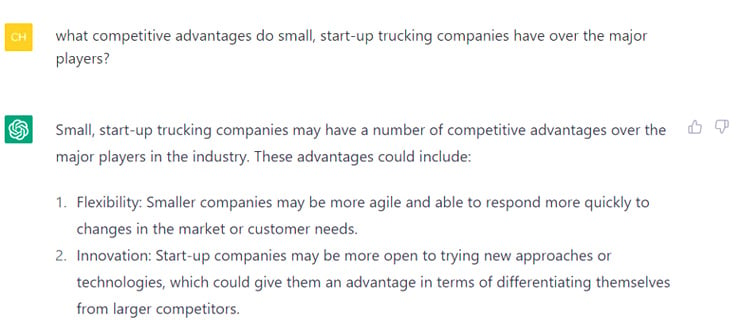
All in all, I got five bullet points worth of content and a nice summary paragraph. It was generic to the point of being useless, to be sure, but it felt more authentically written than anything else I had attempted so far. Still no hard data, though.
I pressed on, testing its ability to write the Market Segmentation and Marketing Strategy sections of the plan, with disappointing results. Overall, I got the impression that asking ChatGPT to write a business plan from scratch for a real banker or investor to read was like expecting someone to give me seed funding because I handed them a printout of a Wikipedia article and called it “market research.”
Clearly, I am expecting far too much of this technology, by an order of magnitude or two. Maybe its highest and best use is to help people take their rough notes and turn them into readable text.
I decided to give ChatGPT my rough notes about a business concept and ask the tech to write a company overview, just as our writers do with each plan.
First, I inputted one paragraph of basic notes about a daycare company, which it succeeded in turning into five paragraphs of grammatically perfect, but stylistically boring text – one quality that can make or break a piece of writing.
What it lacked in pathos and specificity, it attempted to make up for with some generic fluff about caring for the safety and well-being of all children. However, the entire piece was written in first person (using we/our instead of the business plan standard style of referring to the business in the third person “the Company” and “it.”)
A professional writer could take this generic text, comb through it for all instances of first person, and then rewrite it to add that stylistic touch that turns generic notes into a compelling and professionally written piece of narrative. Again, this will save no time over an experienced writer simply writing it from scratch, nor will it produce better content, but I suppose it would be a fun new toy for a writer to play around with.
I would not recommend a layperson try to pass this off as their formal business plan to an investor or bank, who will hear 12 pitches today and is looking for the one that stands out from the pack.
Taking my expectations down one more order of magnitude led me to attempt to see if ChatGPT can reword something that a writer feels unimpressed with. It happens to the best of us: you write a piece, but you feel like it’s lacking something, that je ne sais quois that would give it life; the very qualities that would capture a lender or investor’s attention and help set this company apart from the many other businesses seeking loans or investment.
So, I pasted in part of one of our sample plans that we show to prospective clients to see if ChatGPT could reword it and improve it meaningfully.
The result here was my biggest disappointment since trying to get the tool to create a market analysis.
I asked ChatGPT to reword about six pages of highly detailed content about a boutique hotel, expecting it to revise any awkward phrasing or reorganize content so that it flows together better.
Instead, ChatGPT returned to me one large paragraph of 302 words (about half a page), having stripped it of nearly all details, and replacing it with cheesy phrasing.
Sorely disappointed, I have now arrived at the same conclusion that I came to the last time an AI language tool would supposedly replace my job or at least help me become a more efficient writer: it is not yet time for me to go paging Sarah Connor.
The robots have a long way to go before they can artificially generate human creativity, passion, relationships, skills, and background knowledge. But, they call it machine learning for a reason — it will continue to learn and improve.
So maybe one day they will get there, and then I can retire and ride off into the sunset, having been finally replaced by AI. I asked ChatGPT to weigh in on its own ability to “do 90% of white collar jobs in existence,” as Varun Mayya above said it could.
The result* is probably the best thing ChatGPT wrote for me today, apart from its Mad Libs article on hunting dragons:
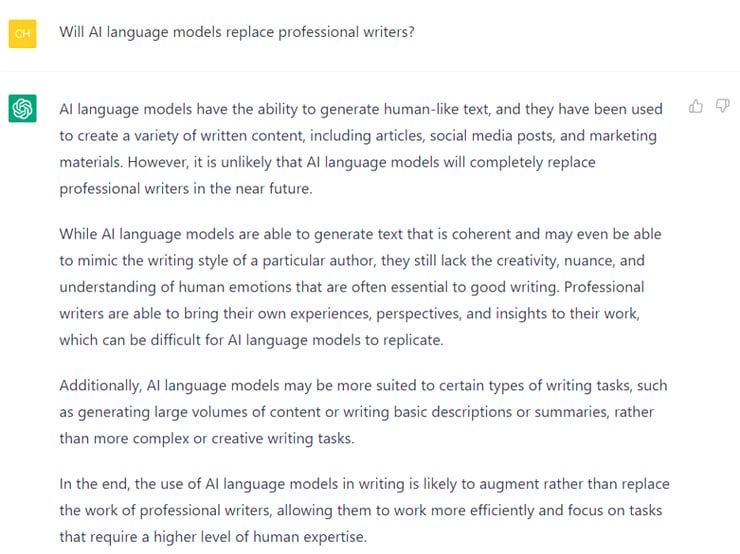
*It was probably written by a human.
Have I been a bit harsh? Probably. The world’s efficiency experts and tech bros will likely tell me that the average reader is not as sophisticated as I assume and write me off as a luddite who thinks her skills are far more valuable than they are.
Which could very much be the case. Everyone has a blind spot when it comes to their own intrinsic value as a worker. We all want to believe in our contributions to our workplace and to society as a whole.
But the way I see it, it’s a competitive world out there. Businesses are seeking funding in a cutthroat environment where they have to come prepared. They have to show their audience that they are creative, diligent, and thoughtful, and that they have researched their concept thoroughly. They have to show that they deeply understand their competitive landscape, and that they have much more than just a general idea of how they might set themselves apart from the big guys and how they can capture the attention of new customers. They certainly cannot afford to presume incompetence on the part of the reader.
Above all, they have to be able to speak passionately and with great clarity and precision about the need that they’re hoping to meet in this world.
None of this is currently in the AI language generator’s wheelhouse. At least not yet.
So what is AI-written content even good for? Can I temper my skepticism and think of a useful application for ChatGPT and its cohort? Yes! Writer’s block is a real thing. If you’re feeling drained, as though you are lacking inspiration, and you just can’t bring yourself to put pen to page yet, asking ChatGPT to give you a writing prompt on your topic might just do the trick.
For writers and non-writers alike, fear is a very real stumbling block that prevents them from just starting to articulate what’s in their mind. A pet robot that can start the work for you, unencumbered by the fear of failure, can help you get past the scariest part of a writing project: starting.
I can easily see myself using it for inspiration in my efforts to practice styles of writing outside my current skill set, and that is what every writer should strive to do on a consistent basis.
While ChatGPT might not be applicable to Masterplans and what we do on a professional level, I can also see it helping people who have weaker writing skills or a non-native command of the English language. It can take their text and bring it up to a minimum level of language proficiency, as long as their content already has some valuable insights, a passionate narrative, and clear organization.
It can also help people who struggle with spelling, grammar, and usage write professional emails. So if what you need is a glorified spell-check and meaningless fluff generator, ChatGPT will do wonders for you.
I must give the caveat/warning that you should never fully trust its results, meaning that you need to carefully read through whatever it produces before sending it to your audience.
I also know that the technology can be used to create code in languages like Python and JavaScript. But as to whether it does so better than it writes narrative text, I won’t comment as I’m not a programmer. I’ll leave that to the experts.
And before I leave this topic for another day, it’s important to recognize that machine learning isn’t going away. So, lest we end on a down note, I thought I’d have ChatGPT spin us one last yarn about another time when workers thought their jobs were going to be imminently replaced by a machine:
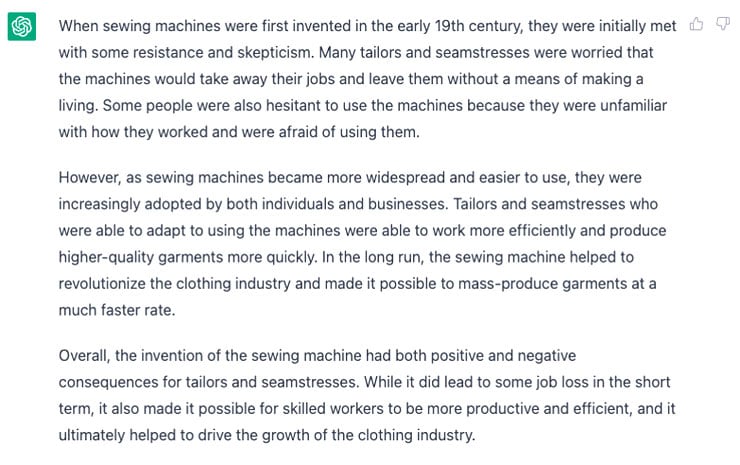
Apologies for the yarn joke; I couldn't help myself.
Innovation in technology and industry has a long history of leading to increased productivity and efficiency. When new tools or machines are developed, they often allow workers to complete tasks more quickly or with less effort. This has been true throughout history, and it is likely to continue in the future as well.
Machine learning, in particular, has the potential to revolutionize many industries by automating tasks and processes that were previously done manually. While it is true that some jobs may be replaced by machines, it is also likely that machine learning will create new job opportunities and increase overall productivity.
For example, machine learning algorithms can be used to analyze large amounts of data and make predictions or recommendations based on that data. This can help businesses to make better decisions and operate more efficiently. Similarly, machine learning can be used to automate tasks that are repetitive or time-consuming, freeing up workers to focus on more complex or creative tasks.
Overall, the impact of machine learning on the workforce is likely to be complex, with both positive and negative consequences. However, the long-term trend of increased productivity and efficiency that has been seen in the past is likely to continue as machine learning and other technologies continue to advance. So, it is important for workers to stay up-to-date with new technologies and be willing to adapt and learn new skills in order to stay competitive in the job market.
Ok, fine, ChatGPT wrote that last section, too. Except the yarn joke.
Only a human would do that.

Entrepreneurs are often celebrated for their uncanny ability to understand others – their customers, the market, and the ever-evolving global...
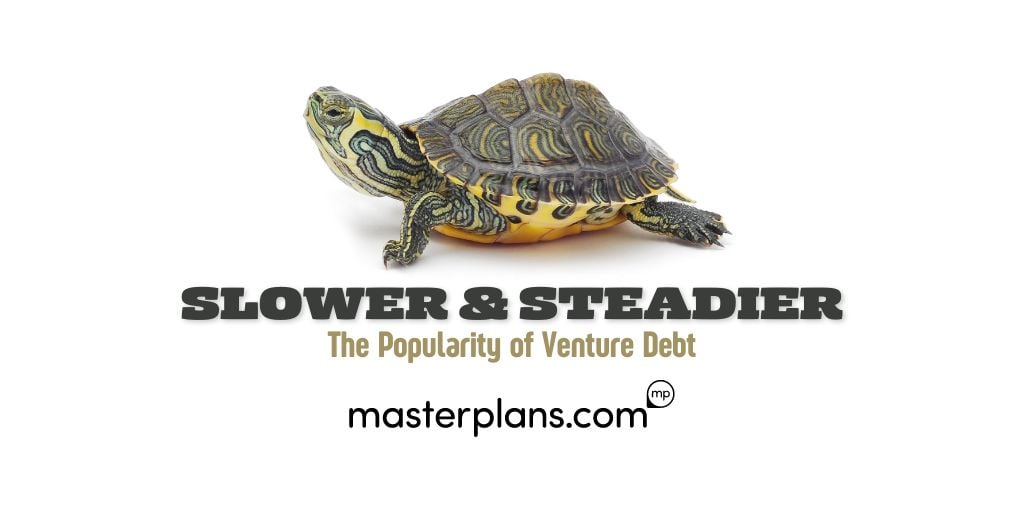
Despite growth in sectors like artificial intelligence, venture capital funding has seen better days. After peaking at $347.5 billion in 2021, there...

Most people think of a professional business plan company primarily as a "business plan writer." However, here at Masterplans, we choose to approach...